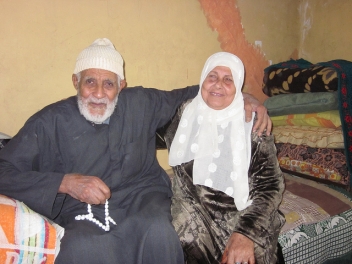Ensuring older people enjoy their right to appropriate and accessible healthcare is a fundamental part of our work. The idea can be summarised quite simply in a sentence, but the reality of achieving this is far more complex.
This is exactly what I am discovering as I visit our programmes and partners in the occupied Palestinian territory.
The situation is delicate. Even with some background knowledge, I find myself asking Sonja, our Programme Director here a lot of questions. Who provides healthcare and where? How can efforts be coordinated with so many groups involved? The answers aren’t simple, but I am reassured to find a core of committed people trying to overcome these obstacles.
With World Health Day approaching (7 April) and the theme this year being ageing, it was fitting that our first meeting was with Anita Vitullo and Dr Tasneem Atatrah from the advocacy team at WHO.
It was great to find out about their work and their plans for World Health Day. One idea is a film competition for children –a great way of raising awareness of the health issues that older people face here.
A desperate need for material and human resources
Two points stuck with me after our meeting. There should be no barriers to health for Palestinians of any age but for this to happen, resources – both material and human – are desperately needed. There is currently a shortage of fuel in the Gaza strip and a chronic shortage of medication throughout the occupied territories. Due to difficulties in importing spare parts, it is also difficult to maintain medical equipment.
The current situation in Gaza means it is near impossible for medical materials to be transferred there. As with resources arriving, there are also issues with people needing to leave for medical assistance.
The WHO has published a report “Referral of Patients to Gaza” to raise awareness of how Palestinians in need of medical care seek permission to travel outside Gaza. It can be the difference between life and death. However, the report finds that permits are frequently rejected without reason. Sometimes permits arrive after hospital appointments are due, people are interrogated, ambulances stopped…the list is long.
The statistics show that older people often fare better than other groups when requesting permission to travel. However, this disguises the reality that older people often don’t bother applying because they are aware of the difficulties.
To get a better idea of how this process works, watch this video: “What if London was occupied“
Barriers to healthcare
We also discussed the lack of geriatric care. As in many other countries we work in, it is difficult to get health practitioners to acknowledge older people’s health as an issue.
Often the problem is the myth that older people are looked after by their families. However with the traditional family structures changing due to migration and increasing poverty, this is not always the case.
Overall though, it was encouraging to hear that these issues are being dealt with. There are also concrete plans in place, such as a strategy on non-communicable diseases, that older people here should benefit from.
Difficulties faced by Palestinians
Yesterday, we followed up with more discussions on health at the health and nutrition cluster meeting in Ramallah, which required crossing from Israel to the West Bank. We went through a checkpoint, past queues of Palestinians waiting to cross by foot.
Then the wall loomed ahead. It doesn’t seem to go anywhere but at the same time seems endless and intimidating. Another reminder of the difficulties people here face accessing anything, let alone healthcare.
With other agencies including, UNRWA, MDM, MSF, CARE, WHO and Handicap International, we dived straight into the issue of the current fuel crisis in Gaza. Via video link from Gaza, partners informed us that there was enough power left for three days and no agreement between Egypt, Paletinian authorities and Israel on next steps.
I was gobsmacked. What would happen to those needing medical assistance? Others in the meeting seemed a lot less so. A normal occurrence here, I suspect.
Then our discussion returned to World Health Day, or what will be a month of activities to highlight the issues associated with ageing and health. I hope that photos and stories of older people I meet here will help raise awareness of older people’s right to healthcare.
More to follow as I visit our partners programmes in Hebron.
Read more about our work on older people’s access to health
To keep up to date with Sarah’s visit to oPt follow her on Twitter @sarahmarzouk
